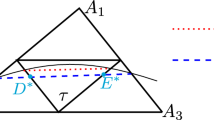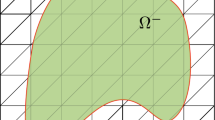Abstract
This paper presents a lowest-order immersed Raviart–Thomas mixed triangular finite element method for solving elliptic interface problems on unfitted meshes independent of the interface. In order to achieve the optimal convergence rates on unfitted meshes, an immersed finite element (IFE) is constructed by modifying the traditional Raviart–Thomas element. Some important properties are derived including the unisolvence of IFE basis functions, the optimal approximation capabilities of the IFE space and the corresponding commuting digram. Optimal finite element error estimates are proved rigorously with the constant independent of the interface location relative to the mesh. Some numerical examples are provided to validate the theoretical analysis.


Similar content being viewed by others
Data Availibility
Enquiries about data availability should be directed to the authors.
References
Babuška, I.: The finite element method for elliptic equations with discontinuous coefficients. Computing 5, 207–213 (1970)
Barrett, J.W., Elliott, C.M.: A finite-element method for solving elliptic equations with Neumann data on a curved boundary using unfitted meshes. IMA J. Numer. Anal. 4, 309–325 (1984)
Barrett, J.W., Elliott, C.M.: Fitted and unfitted finite-element methods for elliptic equations with smooth interfaces. IMA J. Numer. Anal. 7, 283–300 (1987)
Boffi, D., Brezzi, F., Fortin, M.: Mixed Finite Element Methods and Applications, vol. 44. Springer, New York (2013)
Bramble, J.H., King, J.T.: A finite element method for interface problems in domains with smooth boundaries and interfaces. Adv. Comput. Math. 6, 109–138 (1996)
Brenner, S., Owens, L., Sung, L.: A weakly over-penalized symmetric interior penalty method. Electron. Trans. Numer. Anal. 30, 107–127 (2008)
Brenner, S., Scott, L.: The Mathematical Theory of Finite Element Methods. Texts in Applied Mathematics, vol. 15. Springer, Berlin (2008)
Brezzi, F., Fortin, M.: Mixed and Hybrid Finite Element Methods. Springer, Berlin (1991)
Burman, E., Guzmám, J., Sánchez, M.A., Sarkis, M.: Robust flux error estimation of an unfitted Nitsche method for high-contrast interface problems. IMA J. Numer. Anal. 38, 646–668 (2018)
Cao, S., Chen, L., Guo, R.: A Virtual Finite Element Method for Two Dimensional Maxwell Interface Problems with a Background Unfitted Mesh. arXiv:2103.04582 (2021)
Chen, Z., Zou, J.: Finite element methods and their convergence for elliptic and parabolic interface problems. Numer. Math. 79, 175–202 (1998)
Chu, C.-C., Graham, I.G., Hou, T.-Y.: A new multiscale finite element method for high-contrast elliptic interface problems. Math. Comp. 79, 1915–1955 (2010)
Foote, R.L.: Regularity of the distance function. Proc. Am. Math. Soc. 92, 153–155 (1984)
Frei, S., Richter, T.: A locally modified parametric finite element method for interface problems. SIAM J. Numer. Anal. 52, 2315–2334 (2014)
Fries, T., Belytschko, T.: The extended/generalized finite element method: an overview of the method and its applications. Int. J. Numer. Meth. Eng. 84, 253–304 (2010)
Gilbarg, D., Trudinger, N.S.: Elliptic partial differential equations of second order. Classics in Mathematics. Springer, Berlin. Reprint of the 1998 edition (2001)
Guo, R.: Solving parabolic moving interface problems with dynamical immersed spaces on unfitted meshes: fully discrete analysis. SIAM J. Numer. Anal. 59, 797–828 (2021)
Guo, R., Lin, T.: A group of immersed finite-element spaces for elliptic interface problems. IMA J. Numer. Anal. 39, 482–511 (2019)
Guo, R., Lin, T.: An immersed finite element method for elliptic interface problems in three dimensions. J. Comput. Phys. 414, 109478 (2020)
Guo, R., Lin, T., Lin, Y.: A fixed mesh method with immersed finite elements for solving interface inverse problems. J. Sci. Comput. 79, 148–175 (2019)
Guo, R., Lin, T., Lin, Y.: Recovering elastic inclusions by shape optimization methods with immersed finite elements. J. Comput. Phys. 404, 109123 (2020)
Guo, R., Lin, Y., Zou, J.: Solving two dimensional H(curl)-elliptic interface systems with optimal convergence on unfitted meshes. arXiv:2011.11905 (2020)
Guzmán, J., Sánchez, M.A., Sarkis, M.: A finite element method for high-contrast interface problems with error estimates independent of contrast. J. Sci. Comput. 73, 330–365 (2017)
Hansbo, A., Hansbo, P.: An unfitted finite element method, based on Nitsche’s method, for elliptic interface problems. Comput. Methods Appl. Mech. Eng. 191, 5537–5552 (2002)
He, X., Lin, T., Lin, Y.: Approximation capability of a bilinear immersed finite element space. Numer. Methods Partial Differ. Equ. 24, 1265–1300 (2008)
He, X., Lin, T., Lin, Y.: The convergence of the bilinear and linear immersed finite element solutions to interface problems. Numer. Methods Partial Differ. Equ. 28, 312–330 (2012)
Hou, S., Liu, X.: A numerical method for solving variable coefficient elliptic equation with interfaces. J. Comput. Phys. 202, 411–445 (2005)
Huang, J., Zou, J.: Some new a priori estimates for second-order elliptic and parabolic interface problems. J. Differ. Equ. 184, 570–586 (2002)
Huang, J., Zou, J.: Uniform a priori estimates for elliptic and static Maxwell interface problems. Discrete Contin. Dyn. Syst. Ser. B 7, 145–170 (2007)
Ji, H., Wang, F., Chen, J., Li, Z.: Analysis of nonconforming IFE methods and a new scheme for elliptic interface problems. arXiv:2108.03179 (2021)
Ji, H., Wang, F., Chen, J., Li, Z.: A new parameter free partially penalized immersed finite element and the optimal convergence analysis. Numer. Math. 150, 1035–1086 (2022)
Kwak, D.Y., Wee, K.T., Chang, K.S.: An analysis of a broken \(P_1\)-nonconforming finite element method for interface problems. SIAM J. Numer. Anal. 48, 2117–2134 (2010)
Li, J., Markus, J., Wohlmuth, B., Zou, J.: Optimal a priori estimates for higher order finite elements for elliptic interface problems. Appl. Numer. Math. 60, 19–37 (2010)
Li, Z.: The immersed interface method using a finite element formulation. Appl. Numer. Math. 27, 253–267 (1998)
Li, Z., Lin, T., Lin, Y., Rogers, R.: An immersed finite element space and its approximation capability. Numer. Methods Partial Differ. Equ. 20, 338–367 (2004)
Li, Z., Lin, T., Wu, X.: New Cartesian grid methods for interface problems using the finite element formulation. Numer. Math. 96, 61–98 (2003)
Lin, T., Lin, Y., Zhang, X.: Partially penalized immersed finite element methods for elliptic interface problems. SIAM J. Numer. Anal. 53, 1121–1144 (2015)
Lin, T., Zhang, X.: Linear and bilinear immersed finite elements for planar elasticity interface problems. J. Comput. Appl. Math. 236, 4681–4699 (2012)
Peskin, C.: Numerical analysis of blood flow in the heart. J. Comput. Phys. 25, 220–252 (1977)
Raviart, P.A., Thomas, J.M.: A mixed finite element method for second order elliptic problems. Mathematical Aspects of the Finite Element Method, Lecture Notes in Math., 606, Springer, Berlin (1977)
Wang, H., Chen, J., Sun, P., Qin, F.: A conforming enriched finite element method for elliptic interface problems. Appl. Numer. Math. 127, 1–17 (2018)
Wang, S., Wang, F., Xu, X.: A Rigorous Condition Number Estimate of an Immersed Finite Element Method. J. Sci. Comput. 83, 29 (2020)
Wu, H., Xiao, Y.: An unfitted \(hp\)-interface penalty finite element method for elliptic interface problems. J. Comput. Math. 37, 316–339 (2019)
Xiao, Y., Xu, J., Wang, F.: High-order extended finite element methods for solving interface problems. Comput. Methods Appl. Mech. Eng. 364, 112964 (2016)
Xu, J.: Error estimates of the finite element method for the 2nd order elliptic equations with discontinuous coefficients. J. Xiangtan Univ. 1, 1–5 (1982)
Zhang, S.: Robust and local optimal a priori error estimates for interface problems with low regularity: mixed finite element approximations. J. Sci. Comput. 84, 40 (2020)
Acknowledgements
The author would like to thank the anonymous referees sincerely for their careful reading and helpful suggestions that improved the quality of the paper.
Funding
This work was partially supported by the National Natural Science Foundation of China (Grants Nos. 11701291, 12101327 and 11801281) and the Natural Science Foundation of Jiangsu Province (Grant No. BK20200848).
Author information
Authors and Affiliations
Corresponding author
Ethics declarations
Conflict of interest
The authors have not disclosed any competing interests.
Additional information
Publisher's Note
Springer Nature remains neutral with regard to jurisdictional claims in published maps and institutional affiliations.
Rights and permissions
About this article
Cite this article
Ji, H. An Immersed Raviart–Thomas Mixed Finite Element Method for Elliptic Interface Problems on Unfitted Meshes. J Sci Comput 91, 66 (2022). https://doi.org/10.1007/s10915-022-01839-2
Received:
Revised:
Accepted:
Published:
DOI: https://doi.org/10.1007/s10915-022-01839-2




